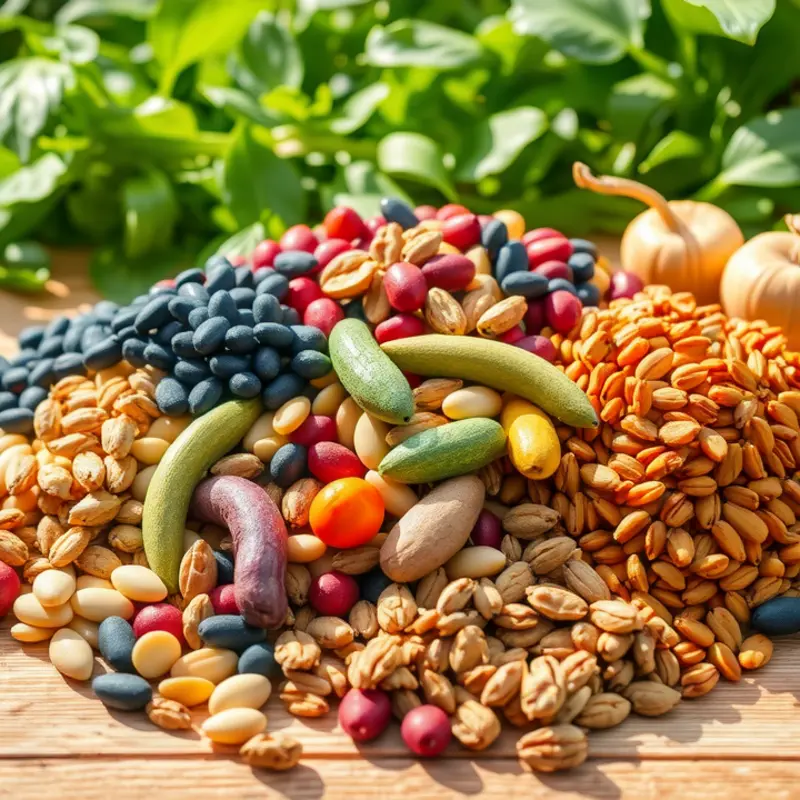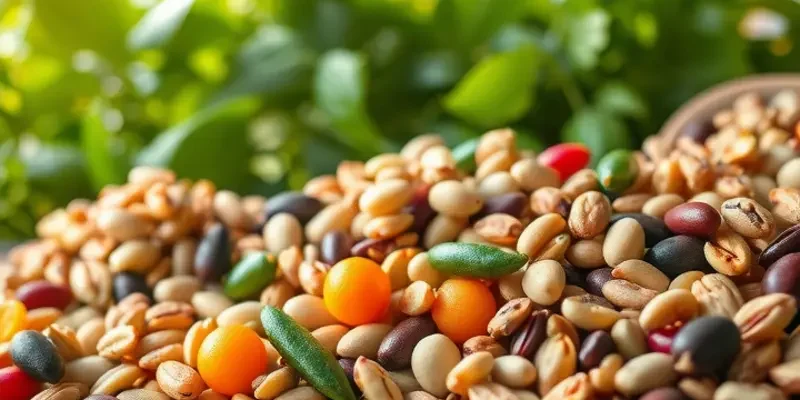As the push for sustainable living grows, many individuals are seeking ways to reduce their environmental impact. Protein plays a vital role in our diets, yet traditional animal farming can contribute heavily to pollution, deforestation, and greenhouse gas emissions. Embracing low-impact protein sources not only supports personal health but also nurtures the planet. Here, we’ll explore various eco-friendly options that are kinder to the Earth while keeping your meals nutritious and delicious.
The Power of Plants

The exploration of plant-based protein sources is a journey into nature’s pantry, offering a spectrum of nourishment with minimal environmental impact. Key players like legumes, nuts, seeds, and whole grains stand out not only for their substantial protein content but also for the sustainable farming practices that many of them entail. Integrating these sources of protein into your meals can significantly reduce your carbon footprint, thereby supporting the health of the planet.
Legumes, such as lentils and chickpeas, are at the forefront of the plant-based protein movement. They are dense in proteins, boasting up to 18 grams per cup, while also providing essential amino acids. Lentils, particularly, are versatile and easily absorb various flavors, making them a favorite in dishes ranging from hearty soups to innovative salads. Chickpeas, another robust choice, can be transformed into hummus or roasted for a crunchy snack.
Nuts and seeds further enrich your diet with nutrients and healthy fats. Almonds, for example, contain around 6 grams of protein per ounce and are rich in vitamin E, magnesium, and heart-healthy fats. They are perfect as a snack or as a topping for cereal and yogurt. Chia seeds, although small, pack a punch with their fiber and omega-3 content. Sprinkle them on oatmeal or blend them into smoothies for a nutritional boost.
Whole grains like quinoa offer a complete protein profile, a rarity among plant foods. With around 8 grams of protein per cup, quinoa is incredibly versatile. Its nutty flavor complements countless ingredients, making it a staple in vegan and vegetarian dishes worldwide. Quinoa can serve as a base for salads, bowls, or even a replacement for rice.
To empower your culinary creativity while supporting sustainable eating, consider these meal ideas:
- Lentil Soup: Combine lentils with vegetables and spices for a comforting and protein-packed meal.
- Chickpea Salad: Mix chickpeas with cucumber, tomato, and avocado for a refreshing and protein-rich salad.
- Quinoa Bowl: Layer quinoa with black beans, roasted vegetables, and a dash of lime for a nourishing bowl.
- Almond Butter Overnight Oats: Blend almond butter, oats, and almond milk, and top with chia seeds for a hearty breakfast.
By diversifying the plant-based proteins on your plate, you enrich your diet while advocating for the planet’s health. For more on enhancing your meals without compromising flavor, explore ideas that focus on using alternative spices and herbs. This approach not only highlights the versatility and benefits of plant-based proteins but also fosters an eco-friendly culinary habit.
Opting for these plant-based proteins is a step towards integrating sustainability in your meals, striking a balance between nutritional adequacy and environmental consciousness. Embrace the versatility these ingredients offer and enjoy the myriad of flavors they bring, knowing that every bite is a commitment to a healthier planet.
Innovative Alternatives

As our food choices evolve, innovative protein sources such as tempeh, edamame, and mycelium-based proteins emerge as stellar alternatives to traditional meats. These options not only boast impressive nutritional profiles but also offer sustainable production methods that align well with an ecological mindset.
Tempeh, a fermented soybean product originating from Indonesia, stands out with its rich umami flavor and robust texture. Packed with protein, fiber, and essential nutrients like magnesium and manganese, tempeh is a versatile choice in plant-based cooking. Its fermentation process enhances digestibility and can support gut health, a benefit highlighted in our non-dairy probiotics guide. Simply slice, marinate, and grill or stir-fry for a filling meal that rivals any meat-based dish.
Edamame, the young form of soybeans, has become a popular snack and salad ingredient. These vibrant green pods are naturally rich in protein, containing all nine essential amino acids, making them a complete protein source. Besides protein, edamame is full of fiber, antioxidants, and vitamins, supporting a well-rounded diet. Enjoy them steamed and lightly salted or toss them into salads and grain bowls for a pop of color and nutrition.
Emerging from the culinary frontier, mycelium-based proteins harness the power of fungi. Mycelium, the vegetative part of fungi, is cultivated in controlled environments to create protein-rich foods. These proteins are low in fat, high in fiber, and serve as excellent meat substitutes due to their chewy texture and earthy flavor. Innovative culinary techniques can utilize mycelium in everything from burgers to pasta, pushing creative boundaries in eco-friendly cooking.
Beyond plant-based options, lab-grown meat shows promise in reducing the environmental footprint of meat production. By cultivating animal cells in laboratory settings, this approach circumvents the need for traditional animal husbandry, lowering greenhouse gas emissions significantly. Although still evolving, lab-grown meat presents a future where meat consumption does not equate to carbon-heavy production.
Another intriguing contender, algae, is celebrated as a superfood capable of nourishing both humans and the planet. Spirulina and chlorella, two well-known edible algae, pack a substantial nutritional punch, providing proteins, vitamins, and minerals. Spirulina’s protein content reaches up to 70% by weight, surpassing most plant proteins. Algae farming requires minimal resources, making it an eco-forward choice. Start small by incorporating algae powders into smoothies or exploring recipes that showcase this aquatic marvel.
Incorporating these innovative proteins into familiar meals ignites the joy of culinary discovery. Depend on minimal prep dinner ideas and functional foods to ease this transition into a more sustainable diet, as covered in our related material. By embracing these cutting-edge protein sources, we can all contribute to a healthier planet and an enhanced palate.
Final words
Transitioning to low-impact protein sources is a rewarding step towards a more sustainable lifestyle. By choosing plant-based proteins and innovative alternatives, individuals can contribute to the preservation of our environment while still enjoying delicious and nutritious meals. Simple shifts in dietary habits can lead to significant positive changes. Embracing these eco-friendly options not only fosters a healthier relationship with food but encourages us all to become stewards of the planet we call home.








